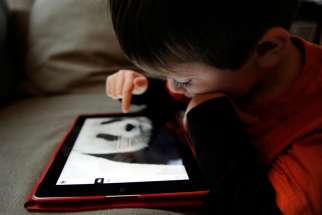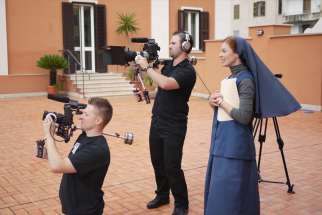Emoji Bible makes God a smiley face with a halo
VATICAN CITY – Happiness "is not an 'app' that you can download on your phones nor will the latest update help you become free and great in loving," Pope Francis told thousands of teenagers.
A family that doesn't eat together is 'hardly a family,' Pope says
VATICAN CITY - A family that chooses to watch TV or play with their smartphones rather than talk at the dinner table is "hardly a family," Pope Francis said.
Vatican urges UN to seek equitable sharing of space technology
UNITED NATIONS - The information and services that space technology provides must be shared as much as possible by the countries of the world to reduce the risk that economic and social inequalities will widen, a Vatican official told the United Nations.
With more than 195 countries using the Instapray app, the world is more connected through prayer than ever before.
Every year, more and more people join, making it easier for everyone to share their prayers through a status on social media and enabling people to pray, share and comment on others’ prayer. It is a global community available to all, and it’s free.
LIMA, Peru - Pope Francis' upcoming encyclical on ecology and climate is expected to send a strong moral message -- one message that could make some readers uncomfortable, some observers say.
You only have to look at the role technology plays in our lives, particularly in the lives of young people, to recognize that we are in an age of instant response and gratification. It is an age of limited analysis where consumerism runs rampant and opinion masquerades as fact.
SAN SALVADOR, El Salvador -- The use of modern media to move and consume news of the beatification of Oscar Romero might be a fitting tribute to the Salvadoran archbishop.
Cubans find technological workarounds to help transmit faith
HAVANA - It's a scene all too familiar in the U.S., but not one you'd expect in Cuba: a group of schoolgirls cupping their cellphones with their hands, protecting them from the glare of the tropical sun. Most are looking at pictures or listening to music downloaded on the phone's memory card. Few can access the Internet using their phones.
Tuning out thanks to technology
The paradox of technology has always intrigued me: it offers great benefits, but not without costs. This interest in the paradox goes back to high school when at Neil McNeil in Scarborough we studied science fiction books like 1984, Brave New World, The Last Western, Future Shock and others that predicted and exposed sinister sides of technology.
Daughters of St. Paul: media mavens for 100 years
TORONTO - Over the years, the strongest of Pauline Sisters could manage the huge printing presses and handle the massive rolls of paper — work that men usually did. But these women religious were determined to share the Gospel the way their founder thought best a century ago: The Daughters of St. Paul were made for media.
Future Goals adds up to student success
Grade 8 student Samantha Bestavros is no hockey fan but the NHL might yet win her over through a new program that uses hockey to make math interesting.
The downside of technology
Too often it can enslave us and strip away parts of our humanity
The three front-page stories in a national newspaper the other day really caught my eye. One was about technology giant Apple Inc.’s impressive financials, the second was about a conference in Montreal on how technology makes life better, and the third was about a massive study of Canadian workers that found we’re overworked and getting more sad all the time.
There seemed to be a thread tying these stories together. Every day we’re bombarded about the virtues of technology, but we rarely take time to think about some of the downsides. For example, we’ve been told for decades that technology makes us more productive and frees us up for more leisure time. Not so, according to the 2012 National Study on Balancing Work and Caregiving in Canada, in which 25,000 workers were surveyed. We’re working longer hours (the vast majority of people are now working more than 45 hours per week) and technology tethers us to the boss and clients on evenings and weekends, once the sole domain of family time.
As I was thinking about technology’s impact, an interesting e-mail dropped in my box. The subject line was “Einstein was right.” Perhaps you’ve received it too, or seen it race around the social media circuits?
It is pictures of young people, each with his or her smartphone in hand, in restaurants and museums, on the beach and in cars. All the pictures show the young folks glued to their screens and ignoring nearby friends.
The caption after the pictures is a supposed quote from Albert Einstein: “I fear the day when technology overlaps with our humanity. The world will only have a generation of idiots.” I say “supposed quote” because I searched long and hard and couldn’t come up with that exact quote.
The closest I could find from the great scientist was: “It has become appallingly obvious that our technology has exceeded our humanity.” Whether the originator of the e-mail took liberty or not with Einstein’s words, you get my point: technology is not pure panacea.
If you have teenage kids, you’ve seen them tap away not hearing a word of what you’ve said. When I was a teenager, I wasn’t the greatest listener either, but today’s teens take it to a whole new level. And it’s not just teenagers. Almost all of us pay way too much attention to our handheld devices, sometimes even in church.
Social media (ie. online relationships through Facebook, Twitter and others) have restructured human relationships. What once was the dynamic experience of having a real-life conversation became selecting from a bunch of dropdown boxes to describe ourselves and our likes. As we become digital, our interactions are dumbed down so that they play nice with technology. We don’t even have to articulate why something makes us happy any more, we just click “Like.”
Things are changing so fast with smartphones and computers for the purpose to entertain us that it gives me an eerie feeling we’re losing some of our humanity as we reach to connect online instead of connecting one-on-one or in real-life communities. Will this lead to a less caring society? I hope not.
But as Christians, we need to think about these things because the teachings of Jesus are about our relationships — with family, friends, strangers, even enemies and, of course, our relationship with God. One need only re-read the beautiful Sermon on the Mount (Matthew 5:1-12) to understand this.
I realize Pope Benedict has urged Catholics, particularly younger ones, to embrace the digital world and the Vatican has even given its approval to an iPhone app that can help us with Confession.
But the Pope also said: “It is important always to remember that virtual contact cannot and must not take the place of direct human contact with people at every level of our lives.”
At that technology conference in Montreal, according to the Globe and Mail, an entrepreneur from Kenya talked about a game he had developed in which players protect trees from illegal loggers.
This, apparently, has helped to change people’s views of the practice in the real world. And that’s a good use of technology; first by helping the environment and second by offering hope and opportunity to bright minds in parts of the world not as wealthy and privileged as we in North America.
But technology can enslave us and strip away parts of our humanity, if we let it. We should remember that the next time we’re sending the boss an update on a Sunday while our family is nearby.
iMary app joins mobile industry
Mother Mary has gone mobile in the form of an app on iTunes.
To coincide with the release of the VisionTV documentary “Our Lady,” Tell Tale Productions has released an iMary app that locates all 83 Marian shrines across Canada.
- Download the app on iTunes now
“These two productions kind of evolved together as sister productions,” said Tell Tale Productions’ president Edward Peill. “There are a number of apps for the rosary and there are a number of apps available for devotions and there are probably a number of apps for the calendar. We decided to combine all of these into one package so you wouldn’t need three or four apps.”
















